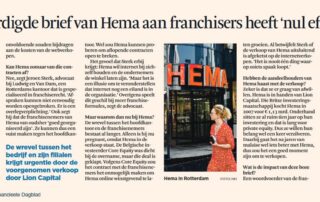Liable and yet rejection claim for damages from franchisor
Court of The Hague
Last year, the District Court of The Hague ruled in a dispute between the franchisor and a former franchisee that the franchisee was liable. However, in the opinion of the franchisor, the damage could not be established in the same main proceedings. As a result, the franchisor claimed in the aforementioned main proceedings that the franchisee be ordered to pay compensation for the damage that had to be drawn up in a so-called damage statement procedure.
Despite the fact that the franchisee has appealed the judgment in the main proceedings, the franchisor has summoned the franchisee in a so-called damage statement procedure. The judgment of the District Court of The Hague in the damage assessment procedure shows that litigation should not be taken lightly in these proceedings.
Insufficiently substantiated
In the right opinion of the court, the franchisor has ruled that the franchisor has inadequately substantiated its damage, i.e. missed positive contractual interest. The franchisor had submitted only a summary overview. The court considered that, in view of the extensive and substantiated dispute by the franchisee, the damage was insufficiently substantiated. The damage must be verifiable for the franchisee. In view of the brief nature of the overview, this was not the case. As a result, the franchisee is unable to verify the claim and is therefore unable to put forward a substantive defense against the claimed damage.
Opportunity for further substantiation?
Despite its request for further substantiation, the franchisor has not been given any further opportunity to provide further substantiation, as it has had sufficient opportunity to do so. After all, the court ruled, the franchisor could have taken a deed two weeks before the hearing to further substantiate its damage. What she left behind. Furthermore, the franchisor could have explained this in more detail at the hearing. She was unable to do this at the hearing. All things considered, the court considers it contrary to due process of law to give the franchisor the opportunity to file its claim after all the aforementioned legal opportunities, also in view of the rising legal costs for the (private) franchisee, who is struggling to keep his head above water. build.
The court therefore rejected the franchisor’s claims and ordered the franchisor to pay the costs of the proceedings.
Mr E. Snoek – Franchise lawyer
Ludwig & Van Dam Franchise attorneys, franchise legal advice Would you like to respond? Mail to info@ludwigvandam.nl

Other messages
Late notification that no franchise agreement will be concluded
On April 11, 2017, EQLI:NL:GHARL:2017:3104, the Amsterdam-Leeuwarden Court of Appeal not only assessed the question of whether the negotiations on a franchise agreement to be concluded
Want to get rid of your franchise agreement in the meantime?
Franchise agreements are usually concluded for a longer period of time. How do you break open a franchise agreement?
HEMA in conflict with franchisees about e-commerce agreements
On 18 July 2018, the District Court of Amsterdam, ECLI:NL:RBAMS:2018:5098, rendered a judgment in proceedings on the merits in which the franchisees were largely ruled in favor of e-commerce.
mr. J. Sterk about HEMA conflict in the FD 18 July 2018
mr. J. Sterk about HEMA conflict in the FD.
Column Franchise+ – “Legal Franchise Statistics 2018”
The Legal Franchise Statistics have been compiled for 10 years by Ludwig & Van Dam attorneys on the basis of all published judgments of judges.
Franchisor prohibits opening (franchise) company
A franchisor applied for interim measures to prohibit a franchisee from opening a franchisee's business.






